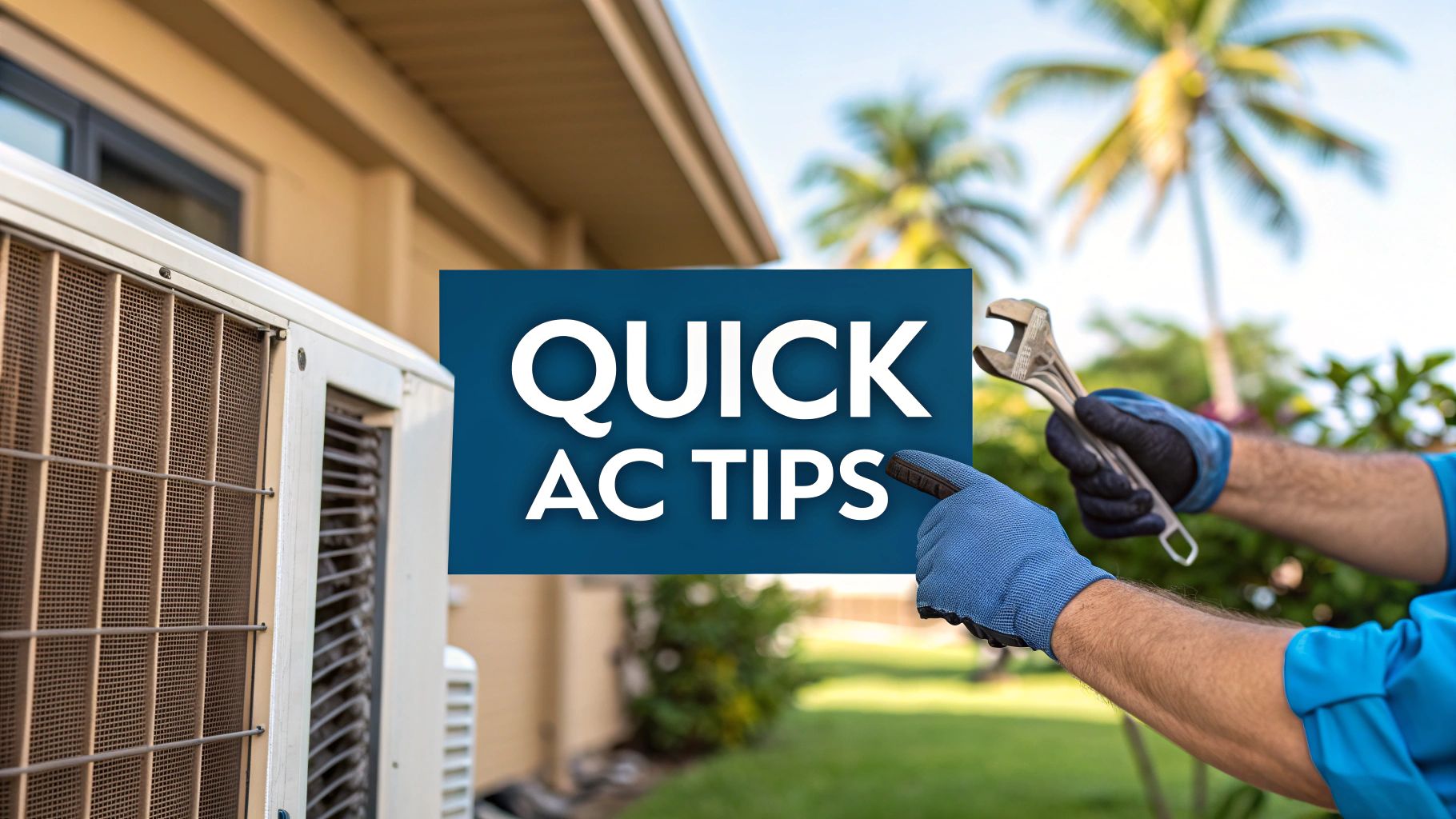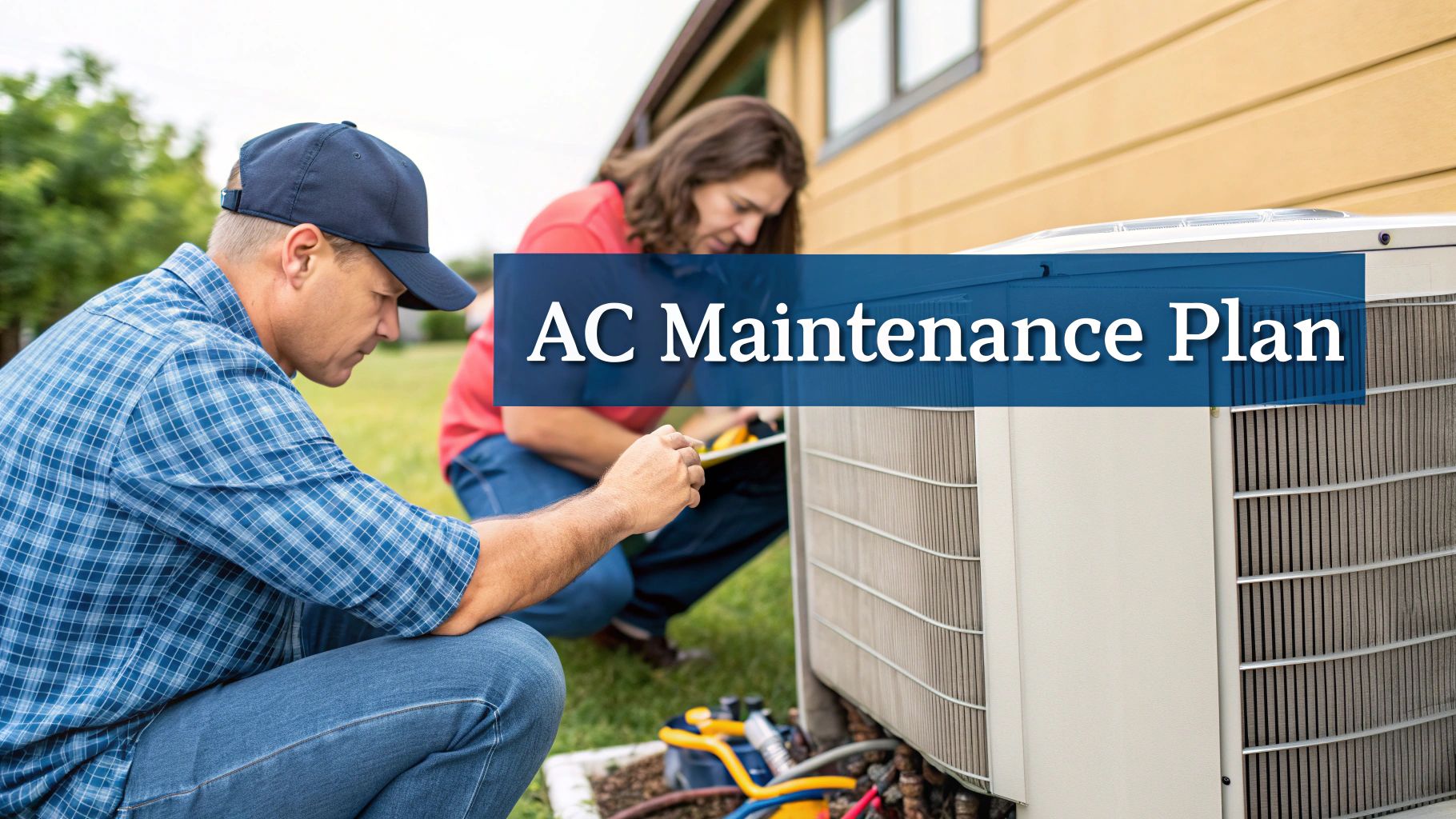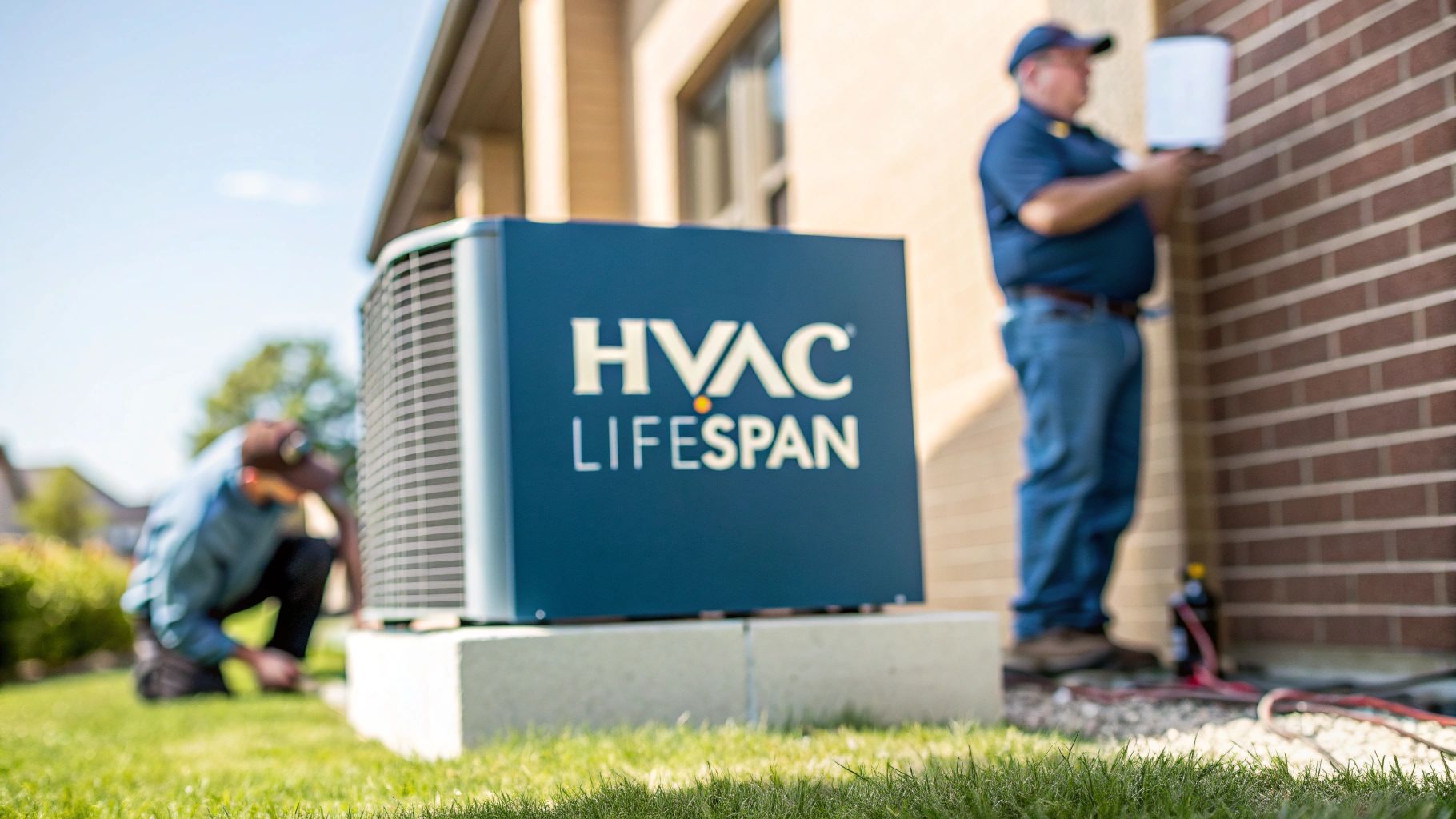Here's the quick answer: If you live in Palm Beach County, you should service your AC twice a year. Think once in the spring to get ready for the heat, and again in the fall to recover from it. At the very least, you need to get it checked out once annually.
Your Palm Beach AC Servicing Guide
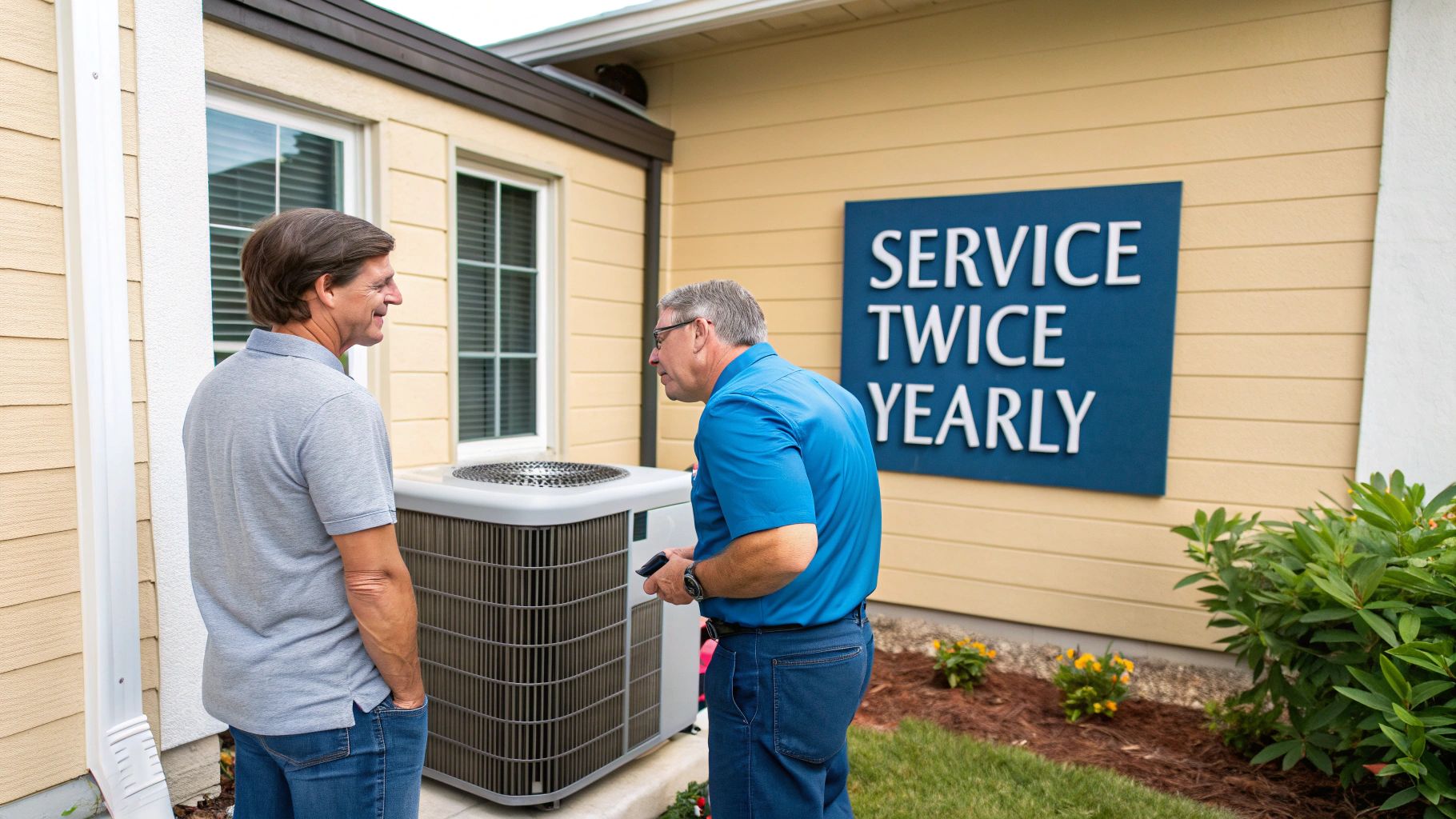
Think of your air conditioner like a car you drive every single day through stop-and-go traffic. That car needs its oil changed far more often than one that just sits in the garage, right? Your AC unit in Florida is exactly the same—it’s battling relentless heat, thick humidity, and even salty air that a system in a milder state never has to deal with.
All that constant work puts a ton of stress on your system. This is why a proactive maintenance schedule isn't just a "nice-to-have"; it's essential if you want your AC to run efficiently and last as long as possible. Scheduling service twice a year gets your system ready for the brutal cooling season and helps it recover after months of running nonstop. The plumbing and HVAC industry is built on this very principle of preventative care.
A consistent maintenance schedule is the best way to prevent unexpected, costly breakdowns during the hottest days of a Florida summer. It shifts your approach from reactive repairs to proactive care.
To make things simple, many homeowners sign up for an AC maintenance plan. It takes the guesswork out of scheduling and often saves you money on any repairs that might pop up.
Recommended AC Service Frequency Guide for Palm Beach
This quick guide will help you figure out how often your AC needs a professional tune-up based on a few key factors we see every day here in South Florida.
| Factor | Recommended Service Frequency | Why It Matters in Florida |
|---|---|---|
| New System (0-5 years) | Twice a year (Spring & Fall) | Keeps your warranty valid and ensures the system runs at peak efficiency right from the start. |
| Mid-Life System (5-10 years) | Twice a year (Spring & Fall) | This is when we start seeing age-related wear. Regular checks catch small issues before they become big ones. |
| Older System (10+ years) | Twice a year (minimum) | Absolutely essential for squeezing every last bit of life out of the unit and avoiding a sudden, expensive failure. |
| Heavy Usage | Twice a year | If your AC is always on, its parts are wearing down faster. More frequent check-ups are a must. |
| Coastal Proximity | Twice a year | That salty air you love is corrosive. Regular inspections and cleaning are needed to prevent rust and damage. |
At the end of the day, a little preventative care goes a long way in our climate. Sticking to a biannual schedule is the smartest way to keep your home cool and your AC running strong for years to come.
Why Bother With Regular AC Maintenance?
It’s one thing to know how often to service your AC, but it's another thing entirely to understand why it’s so crucial. Skipping a tune-up is a lot like skipping an oil change on your car. Sure, it'll still run for a while, but you’re setting the stage for a massive, expensive breakdown down the road.
Don’t think of maintenance as just another bill. Think of it as a smart investment in your home and your wallet. A clean, well-cared-for air conditioner doesn't have to struggle to cool your home, which means it uses less power. That translates directly to lower FPL bills month after month.
Get More Years Out of Your AC Unit
Let's be honest, the heat and humidity here in Palm Beach County are relentless. That puts a huge amount of stress on your air conditioner, day in and day out. All that hard work causes wear and tear that, if ignored, can slash years off your system's life.
Regular tune-ups allow a technician to spot and fix the small stuff—a loose wire, a worn-out part—before it can spiral into a catastrophic failure, like a fried compressor. By catching these things early, you can help your unit reach its full 15-20 year lifespan instead of having it die on you after just a decade.
A simple, proactive maintenance plan is the best tool you have to protect your HVAC investment and dodge the massive, unexpected cost of a premature replacement.
Better Efficiency and Cleaner Air
Over time, your AC's internal parts, like the coils and drain lines, get caked with dust, grime, and sometimes even mold. This buildup acts like insulation, forcing your system to work much harder and longer to do its job, which sends your energy bills soaring.
During a service visit, a technician cleans these critical components, bringing your unit back to its original efficiency. In fact, consistent maintenance can cut your annual energy costs by 5% to 20%. You can dig into more of these HVAC efficiency statistics on ServiceTitan.com.
The benefits go beyond your bank account. A clean system circulates cleaner, healthier air for your family to breathe. It’s a win-win.
Factors That Influence Your AC Service Schedule
That standard "twice-a-year" rule for AC service? It's a great baseline, but it's not a one-size-fits-all solution. Think of it more like a starting point. Several key factors can shift that schedule, creating a maintenance plan that’s actually built for your home and how you live in it.
After all, your AC's performance is tied directly to its environment and workload. An air conditioner running nearly non-stop in a busy family home needs a different level of care than one in a condo that’s empty most of the day. Let's break down what really matters.
The Impact of Your AC Unit's Age and Condition
First things first: how old is your system? A brand-new unit, much like a new car fresh off the lot, is in its prime. It mostly just needs routine check-ups to keep the warranty intact and ensure it's running at peak efficiency from day one.
But once a system gets older, especially after hitting that 10-year mark, things change. Parts start to wear out. The risk of a breakdown climbs. For these veteran units, sticking to a strict biannual service schedule isn't just a good idea—it's essential for spotting trouble before it leaves you sweating on a hot August afternoon.
Your Household's Unique Usage Patterns
How you use your AC has a massive impact on its health. If you have a full house with the thermostat cranked down to 72 degrees all day long, you’re putting way more stress on the system than a single person who's out at work and keeps the temp higher.
Think about your own home life:
- Thermostat Settings: Are you aiming for arctic-level cool? The lower you go, the harder your AC has to work.
- Home Occupancy: Is your home a hub of activity 24/7, or is it empty for long stretches?
- Indoor Air Quality Needs: If you have pets, smokers, or family members with allergies, your system is working overtime to filter out dander, smoke, and dust. This can clog up filters and coils much faster.
This simple chart helps map out how these factors—age, usage, and air quality—should guide your maintenance plan.
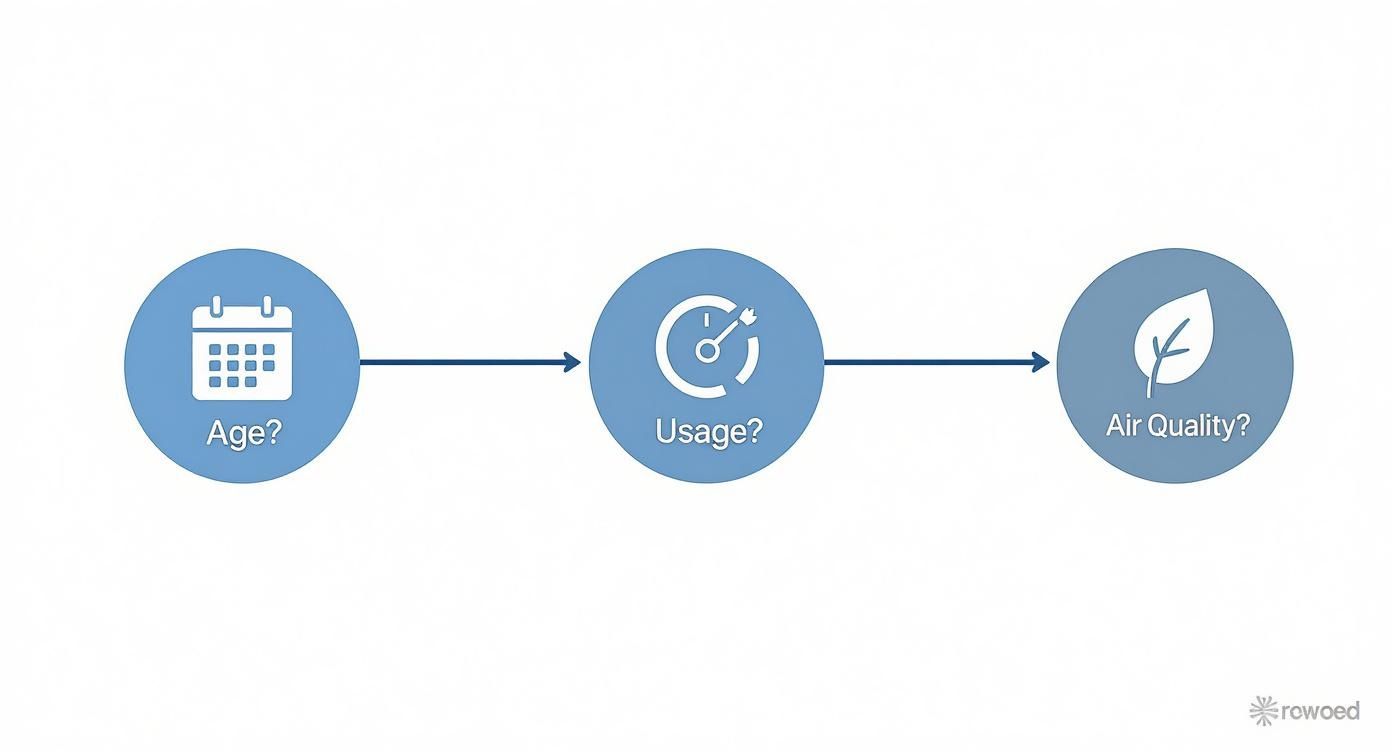
The bottom line is simple: higher demand on your system always means it needs more frequent attention. Whether that demand comes from age, constant use, or a need for cleaner air, skipping a tune-up is a risky bet against the Florida heat.
What a Professional AC Tune-Up Actually Includes
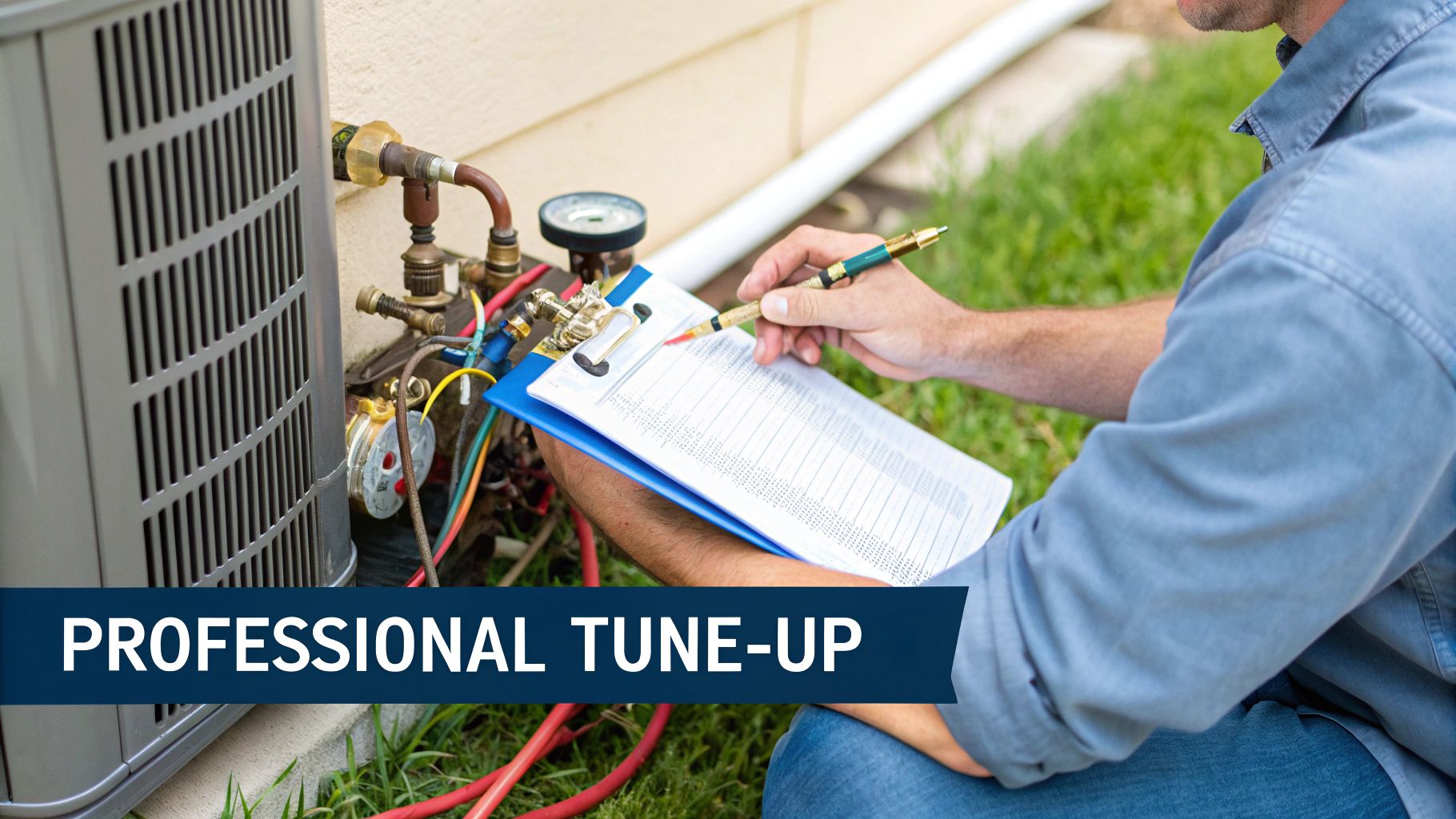
Knowing how often to service your AC is one thing, but understanding what you’re actually paying for is a whole different ballgame. A real professional tune-up is so much more than a quick filter swap. It's a comprehensive health check for your system, designed to spot trouble long before it leaves you sweating on a hot Florida afternoon.
Think of it like a doctor's physical for your AC's most critical parts. The main goals are to bring back lost efficiency, double-check all the safety features, and fix minor issues before they spiral into a catastrophic failure. It’s the single best proactive step you can take for your system's performance and longevity.
The Essential Tune-Up Checklist
A quality tune-up involves a detailed inspection of your entire system, from the indoor air handler all the way to the outdoor condenser unit. While every company has its own process, any thorough service should always cover these key bases:
- Clean Evaporator and Condenser Coils: When these coils get caked with dirt and grime, your AC has to work overtime, sending your electric bill through the roof. A good cleaning is one of the quickest ways to boost efficiency.
- Check Refrigerant Levels: The right amount of refrigerant is non-negotiable. Too much or too little can wreck your compressor—the heart of the entire system. A technician makes sure the levels are perfect for peak cooling power.
- Inspect Electrical Connections: Over time, vibrations can loosen electrical connections. A tech will tighten everything up and measure voltage to prevent dangerous failures and ensure your unit operates safely.
- Clear the Condensate Drain Line: Here in our humid climate, it’s easy for this line to get clogged with gunk. That can lead to water backing up into your home, causing serious damage. Clearing it is a must.
A professional tune-up is not just a cleaning service; it's a detailed inspection that verifies the safety, efficiency, and mechanical soundness of your entire cooling system.
The table below breaks down some of the key tasks a qualified technician will perform during a comprehensive visit. It's a behind-the-scenes look at what keeps your system humming.
| Component Check | Task Performed | Benefit to Your System |
|---|---|---|
| Blower Motor & Wheel | Inspect and clean components, check amperage draw. | Ensures proper airflow for even cooling and less strain on the system. |
| Capacitors & Relays | Test for proper electrical ratings and function. | Prevents sudden breakdowns of the fan and compressor. |
| Thermostat | Calibrate and test for accurate temperature readings. | Improves comfort, prevents unnecessary runtime, and saves energy. |
| Ductwork | Visually inspect accessible ducts for leaks or damage. | Stops cooled air from escaping into your attic, boosting efficiency. |
This detailed process ensures every part of your unit is ready to handle the long cooling season ahead. For an even more exhaustive breakdown of what's involved, you can look over a complete HVAC preventive maintenance checklist and see every single task for yourself.
The High Cost of Neglecting Your AC System
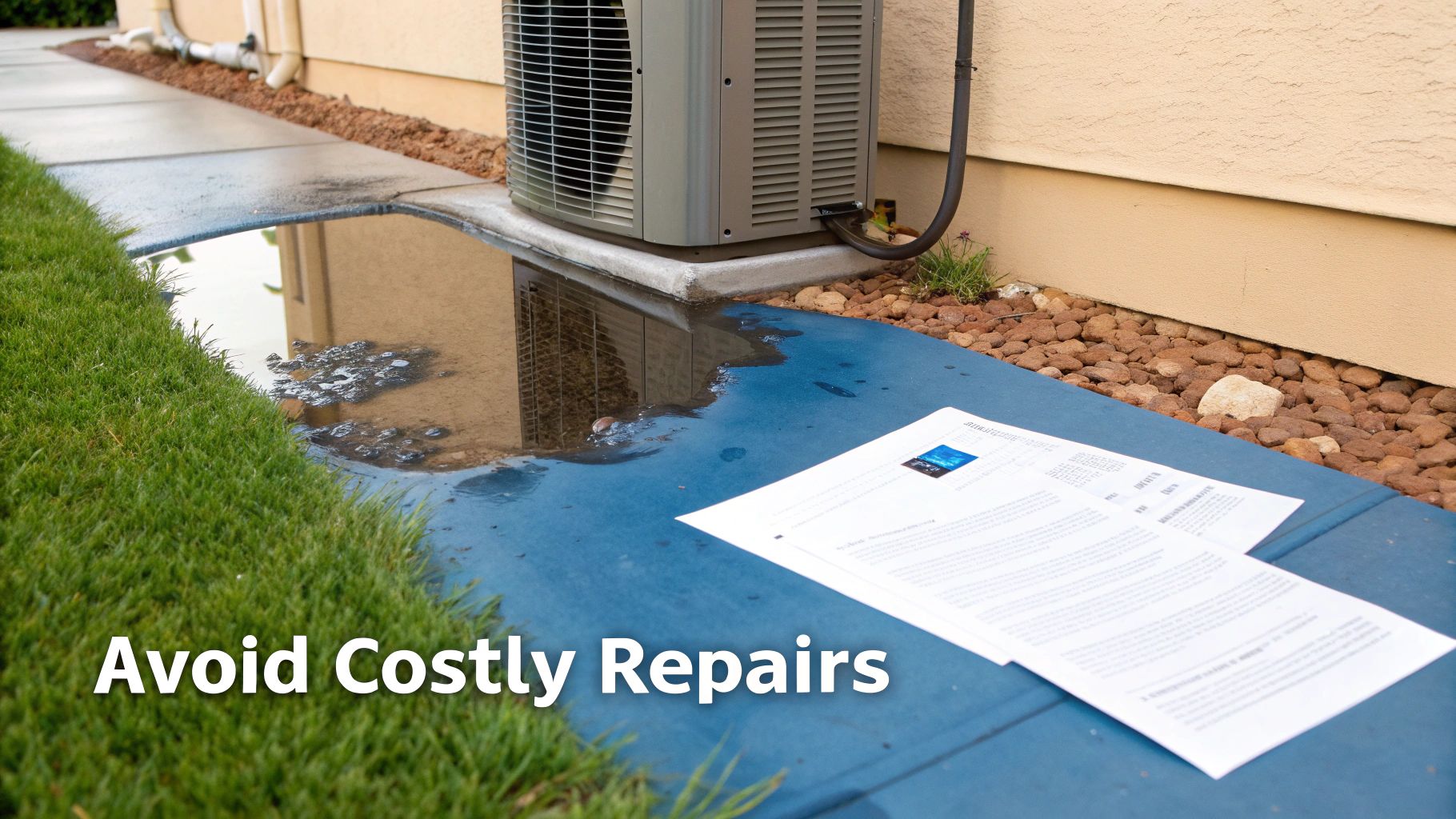
It’s tempting to skip your AC service, thinking you’re saving a few bucks. But that small saving is a huge gamble. A tiny, fixable problem can snowball into a wallet-draining emergency repair.
Think of it like this: a technician can spot and clear a clogged drain line in minutes during a routine visit. If you let it go, that same clog can cause water to back up, overflow, and ruin your ceiling, drywall, and floors. Suddenly, you're looking at thousands in water damage—all for a problem that a simple service call would have headed off at the pass.
Waiting for something to break is always the more expensive route. You're not just paying for the repair; you're paying for the chaos and secondary damage that comes with it.
Proactive maintenance is about control. You control the timing and the cost. Reactive repairs mean the breakdown controls your schedule and your budget, almost always at the worst possible moment.
From Minor Annoyance To Major Expense
The fallout from neglect isn’t just about water damage. When your AC coils get caked with dirt and dust, the whole system has to fight harder just to cool your home. This constant strain hammers your compressor—the most expensive part of your unit—and sends your FPL bill through the roof.
A struggling compressor will eventually burn out, leaving you with a repair bill that can easily stretch into the thousands. When you're facing that, the question of how much an air conditioner service costs feels a lot less intimidating.
Regular service is your best defense against these nasty surprise expenses. Studies show that a good maintenance plan can cut down system breakdowns by 70% to 75% and reduce the downtime from those failures by up to 45%.
Keeping up with AC service isn't just about staying comfortable. It's one of the smartest financial decisions you can make for your home.
Common Questions About AC Servicing
https://www.youtube.com/embed/pBBnXHse-T0
Even with a good maintenance plan, you probably still have a few questions about keeping your air conditioner running smoothly. That’s perfectly normal. Getting straight answers helps you make smart decisions for one of the most important (and expensive!) appliances in your home.
Let's dive into some of the most common questions we get from homeowners right here in Palm Beach County.
A frequent point of confusion is what you can do yourself versus what a pro needs to handle. You should absolutely be changing your air filters every 1-3 months. Think of it as non-negotiable homework. But that's just one piece of a much larger puzzle.
A professional tune-up goes way deeper. We’re talking about checking electrical connections, testing refrigerant pressures, and cleaning internal parts you can’t easily or safely reach. It's like this: changing your filter is like topping off your car's windshield wiper fluid. An AC tune-up is like getting a full engine diagnostic and oil change from a mechanic.
When Is the Best Time to Schedule Service?
Timing is everything. For AC maintenance, the sweet spots are what we call the "shoulder seasons"—specifically, spring and fall.
A spring tune-up gets your system ready for the brutal summer ahead, catching small problems before they turn into a full-blown breakdown on a 95-degree day. A fall check-up lets your AC recover from its summer marathon and ensures it's ready for those surprisingly warm winter days.
Plus, booking during these milder seasons means you'll beat the summer rush when HVAC companies are swamped with emergency calls.
How to Choose a Trustworthy HVAC Company
Finding a technician you can rely on in Palm Beach is critical. Before you let anyone work on your system, do a little homework to protect yourself.
- Check for Licensing and Insurance: Make sure they're licensed to work in Florida and carry proper insurance. This isn't just a suggestion; it protects you.
- Read Recent Reviews: See what your neighbors are saying on sites like Google, Yelp, or Angi. Look for patterns in their feedback—good or bad.
- Get a Written Estimate: A pro will always give you a clear, itemized estimate before starting any work. No surprises.
Taking these few steps can save you a lot of headaches and ensure you're working with a true professional.
Ready to schedule your next AC service with a team you can trust? The certified experts at Florida Cooling Group are here to keep your system running at peak performance. https://floridacoolinggroup.com

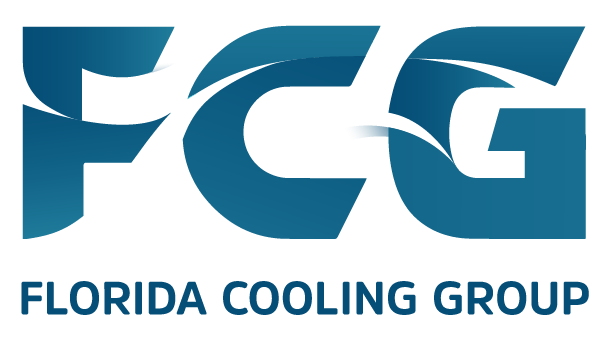
 (561) 400-2205
(561) 400-2205